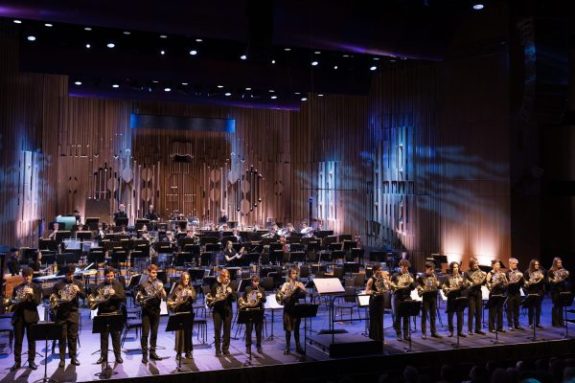 United Kingdom Howard, Smetana, R. Strauss: National Youth Orchestra / Sir Mark Elder (conductor). Barbican Hall, London 4.1.2024. (CK)
United Kingdom Howard, Smetana, R. Strauss: National Youth Orchestra / Sir Mark Elder (conductor). Barbican Hall, London 4.1.2024. (CK)

Dani Howard – Ascent (world premiere tour)
Smetana – Vltava (The Moldau) from Má vlast (My Country)
R. Strauss – Alpine Symphony, Op.64
I suppose it was entirely fitting that this earth-shaking performance of Strauss’s monstrous Alpine Symphony took place on a day of extreme weather, for all its inconveniences (a good soaking on the way up, and – thanks to a landslip on the line – a return to Southampton from Waterloo by taxi in the small hours). The piece has had a mixed press: Strauss has been chastised for ‘a certain poverty of invention, a complete paucity of inspiration’ (Alan Jefferson); and the composer’s characteristic remark that he had composed it to pass the time while waiting for Hofmannsthal’s libretto for Die Frau ohne Schatten did nothing to allay suspicions of note-spinning.
Sir Mark Elder clearly believes in it. In a brief but illuminating introduction he indicated places in the score where Strauss seems to be suggesting something bigger behind the picturesque glories of nature – the littleness of Man in an unfathomable Universe; more personally, an elegy for the early death of his great friend and rival Gustav Mahler. Sir Mark also reminded us that the youthful Strauss had made the Alpine ascent which provides the trajectory of the symphony (vastly inflated Tone Poem, rather) when he was 15 – the same age as many of the players behind him.
And what players the National Youth Orchestra are! Over 170 of them (including offstage brass): an orchestra the Royal Albert Hall can just about accommodate, but crammed onto the Barbican Hall stage it is an ensemble that can blow the walls out and the roof off. I fear for the structural integrity of the halls in Nottingham and Coventry where this behemoth of a band is repeating the performance. They played magnificently, corporately and individually: in the great surges of orchestral power, and in the passages of chamber music delicacy too.
It is all too easy to experience the work as a series of Great Moments, and to allow the attention to slacken between them: but in this majestic performance Elder maintained tension and momentum. The offstage hunting horns and trombones in the forest were splendidly vivid; after the atmospheric cowbells in the pasture, flutes and piccolos pierced the air; fearless high trumpets negotiated the glacier, and the exposed wind solos in the tricky Dangerous Moments were securely taken. And so to the summit: the faltering oboe, overwhelmed by vastness, and the horns in full cry. Most memorable of all – in this performance at least – were the implacable brass, complete with Wagner tubas, as the descent begins, in a massive apparition of the mountain motif, revealed now as inscrutable, menacing.
There was further fine work from the woodwind principals on the way down; the storm made a tremendous racket, viscerally exciting (the entry of the thunder sheet was, I think, the loudest noise I have ever heard in a concert hall). Some of the loveliest playing by strings and wind came in the extended and untranslatable Ausklang (here rendered Quiet Settles), winding the journey back to darkness and silence – briefly, before the ovations of a packed hall erupted.

When I left Elder’s performance of Mahler’s Third with the London Philharmonic Orchestra a few weeks ago, I remember thinking: you can’t beat a row of nine horns. How about a row of 17? Dani Howard’s concert opener Ascent, brilliantly conceived for the Alpine Symphony‘s brass and percussion, gave us just that: lined up at the front of the stage, with the rest of the brass and percussion at the back, they played facing forwards, facing back, stamping, blowing soundlessly into their mouthpieces to rattling percussion, while trumpets and trombones mimed like a swing band or Gustavo Dudamel’s Simón Bolivars in fiesta mode… It was compelling theatre: but the lasting impression was of a huge golden sound and a wonderful sense of space, as if we were listening to a super-alphorn calling across an unimaginably wide landscape. Superbly drilled, and conductorless. Something I am unlikely to forget.
With the full orchestra on stage, and as ideal preparation for the Alpine Symphony (there was no interval), Sir Mark Elder and his young players then gave us a much better-known blend of narrative and natural description: Bedřich Smetana’s Vltava. Here the strings came into their own, the limpidly coiling flutes leading to a sumptuous breadth of sound in Smetana’s famous tune. The lively polka was light on its feet; the moonlit nymphs disported themselves gorgeously in the rippling of four harps; piccolos shrieked above the turbulence of the rapids; the castle Vysehrad hove into sight with noble grandeur. This was a mightier river than we normally hear – bursting its banks, as it were, and flooding the hall. An engulfing musical experience: and we hadn’t set foot on the mountain yet.
I have heard the Alpine Symphony in concert a few times; but this is the performance that I will remember. To hear it again, I think, would be to risk disappointment. I don’t think I need to.
Chris Kettle
